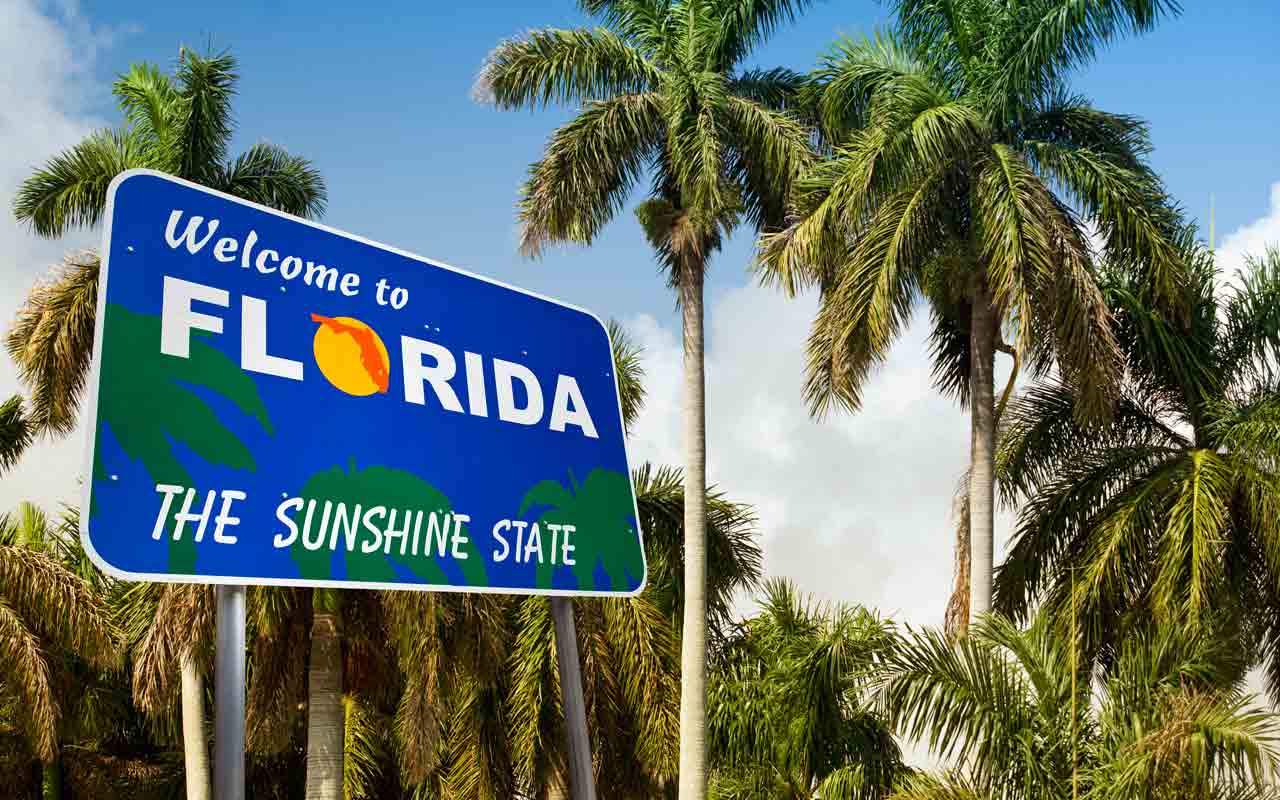38 States That Don't Tax Social Security Benefits
Some retirees are surprised to learn that Social Security is taxable.

Profit and prosper with the best of Kiplinger's advice on investing, taxes, retirement, personal finance and much more. Delivered daily. Enter your email in the box and click Sign Me Up.
You are now subscribed
Your newsletter sign-up was successful
Want to add more newsletters?

Delivered daily
Kiplinger Today
Profit and prosper with the best of Kiplinger's advice on investing, taxes, retirement, personal finance and much more delivered daily. Smart money moves start here.

Sent five days a week
Kiplinger A Step Ahead
Get practical help to make better financial decisions in your everyday life, from spending to savings on top deals.

Delivered daily
Kiplinger Closing Bell
Get today's biggest financial and investing headlines delivered to your inbox every day the U.S. stock market is open.

Sent twice a week
Kiplinger Adviser Intel
Financial pros across the country share best practices and fresh tactics to preserve and grow your wealth.

Delivered weekly
Kiplinger Tax Tips
Trim your federal and state tax bills with practical tax-planning and tax-cutting strategies.

Sent twice a week
Kiplinger Retirement Tips
Your twice-a-week guide to planning and enjoying a financially secure and richly rewarding retirement

Sent bimonthly.
Kiplinger Adviser Angle
Insights for advisers, wealth managers and other financial professionals.

Sent twice a week
Kiplinger Investing Weekly
Your twice-a-week roundup of promising stocks, funds, companies and industries you should consider, ones you should avoid, and why.

Sent weekly for six weeks
Kiplinger Invest for Retirement
Your step-by-step six-part series on how to invest for retirement, from devising a successful strategy to exactly which investments to choose.
Some retirees are surprised to learn that Social Security is taxable. The federal government taxes up to 85% of your benefits, depending on your income. Most states, however, exempt Social Security from state taxes. The list of 37 states, plus the District of Columbia, that don't tax Social Security includes the nine states with no state income tax, as well as some other states that rank as the most tax-friendly states for retirees, such as Delaware and South Carolina.
But beware: Some states that exempt Social Security benefits take a big bite out of other types of retirement income. Maryland, for example, excludes Social Security benefits from taxation, but distributions from individual retirement accounts are fully taxed. Weigh all state taxes when researching the best places to retire. For each state, we've included a link to our full guide to state taxes on retirees.
The state-by-state guide to taxes on retirees is updated annually based on information from state tax departments, the Tax Foundation, and the U.S. Census Bureau. Income tax rates and thresholds are for the 2019 tax year unless otherwise noted.

Alabama
Sales Tax: 4% state levy. Localities can add as much as 7.5% to that, and the average combined rate is 9.22%. Alabama is one of the few states that does not exempt food from sales tax.
Income Tax Range: Low: 2% (on up to $1,000 of taxable income for married joint filers and up to $500 for single filers). High: 5% (on more than $6,000 of taxable income for married joint filers and more than $3,000 for single filers). Alabama also allows residents to deduct all of their federal income tax (not including certain federal tax credits) from state taxable income. Some cities impose a "municipal occupational tax" of 0.5% to 2% on income paid to workers.
Property Taxes: The median property tax rate in Alabama is $417 per $100,000 of assessed home value.
Inheritance and Estate Taxes: There is no inheritance tax or estate tax.
For details on tax breaks for retirees and state taxes on other retirement income, see the complete guide to taxes on retirees in Alabama.

Alaska
Sales Tax: Alaska is one of five states with no state sales tax. However, localities can levy sales taxes, which can go as high as 7.5%. But, according to the Tax Foundation, the statewide average is only 1.76%.
Income Tax Range: There is no state income tax.
Property Taxes: In Alaska, the median property tax rate is $1,183 per $100,000 of assessed home value.
Inheritance and Estate Taxes: There is no inheritance tax or estate tax.
For details on tax breaks for retirees and state taxes on other retirement income, see the complete guide to taxes on retirees in Alaska.

Arizona
Sales Tax: 5.6% state levy. Localities can add as much as 5.6% to that, but the average combined levy is 8.4%, according to the Tax Foundation. Many cities in Arizona levy a tax on food for home consumption, like Tempe (1.8%) and Scottsdale (1.75%); Phoenix and Mesa are notable exceptions.
Income Tax Range: Low: 2.59% (on up to $53,000 of taxable income for married joint filers and up to $26,500 for single filers). High: 4.5% (on more than $318,000 of taxable income for married joint filers and more than $159,000 for single filers).
Property Taxes: Arizona's median property tax rate is $687 per $100,000 of assessed home value.
Inheritance and Estate Taxes: There is no inheritance tax or estate tax.
For details on tax breaks for retirees and state taxes on other retirement income, see the complete guide to taxes on retirees in Arizona.

Arkansas
Sales Tax: 6.5% state levy. Localities can add as much as 5.125%, and the average combined rate is 9.47%, according to the Tax Foundation. The state taxes food at 0.125% (plus local sales taxes).
Income Tax Range: Low: 2% (on taxable income from $4,600 to $9,099). High: 6.9% (on more than $86,200 of taxable income).
Property Taxes: The median property tax rate for Arkansas homeowners is $629 per $100,000 of assessed home value.
Inheritance and Estate Taxes: There is no inheritance tax or estate tax.
For details on tax breaks for retirees and state taxes on other retirement income, see the complete guide to taxes on retirees in Arkansas.

California
Sales Tax: 7.25% state levy. Localities can add as much as 2.5%, and the average combined rate is 8.66%, according to the Tax Foundation.
Income Tax Range: Low: 1% (on up to $17,618 of taxable income for married joint filers and up to $8,809 for single filers). High: 13.3% (on more than $1,181,484 of taxable income for married joint filers and $1 million for single filers).
Property Taxes: In California, the median property tax rate is $760 per $100,000 of assessed home value.
Inheritance and Estate Taxes: There is no inheritance tax or estate tax.
For details on tax breaks for retirees and state taxes on other retirement income, see the complete guide to taxes on retirees in California.

Delaware
Sales Tax: Neither the state nor localities impose a sales tax.
Income Tax Range: Low: 2.2% (on taxable income from $2,001 to $5,000). High: 6.6% (on more than $60,000 of taxable income).
Property Taxes: For Delaware homeowners, the median property tax rate is $563 per $100,000 of assessed home value.
Inheritance and Estate Taxes: There is no inheritance tax or estate tax.
For details on tax breaks for retirees and state taxes on other retirement income, see the complete guide to taxes on retirees in Delaware.

District of Columbia
Sales Tax: 6%
Income Tax Range: Low: 4% (on up to $10,000 of taxable income). High: 8.95% (on more than $1 million of taxable income).
Property Taxes: In the District of Columbia, the median property tax rate is $548 per $100,000 of assessed home value.
Inheritance and Estate Taxes: Estates valued over $5,762,400 are subject to estate tax. Rates range from 12% to 16%. There is no inheritance tax.
For details on tax breaks for retirees and state taxes on other retirement income, see the complete guide to taxes on retirees in Washington, D.C.

Florida
Sales Tax: 6% state levy. Localities can add as much as 2.5%, and the average combined rate is 7.05%, according to the Tax Foundation.
Income Tax Range: There is no state income tax.
Property Taxes: In Florida, the median property tax rate is $928 for every $100,000 of assessed home value.
Inheritance and Estate Taxes: There is no inheritance tax or estate tax.
For details on tax breaks for retirees and state taxes on other retirement income, see the complete guide to taxes on retirees in Florida.

Georgia
Sales Tax: 4% state levy. Localities can add as much as 5%, and the average combined rate is 7.31%, according to the Tax Foundation. While the state doesn't tax grocery food sales, localities can.
Income Tax Range: Low: 1% (on up to $1,000 of taxable income for married joint filers and up to $750 for single filers). High: 5.75% (on more than $10,000 of taxable income for married joint filers and more than $7,000 for single filers). If approved by the governor and state legislature, the top rate will drop to 5.5% for the 2020 tax year.
Property Taxes: Georgia's median property tax rate is $905 per $100,000 of assessed home value.
Inheritance and Estate Taxes: There is no inheritance tax or estate tax.
For details on tax breaks for retirees and state taxes on other retirement income, see the complete guide to taxes on retirees in Georgia.

Hawaii
Sales Tax: 4% state levy. Hawaii employs a General Excise Tax that applies to a wide range of goods and services (including groceries). In addition, Hawaii, Honolulu, and Kauai Counties also impose a 0.5% surcharge tax to pay for mass transit systems, making the average combined rate 4.44%, as calculated by the Tax Foundation. Complicating matters further, the tax is calculated on the vendor rather than the buyer, which means consumers can pay a few percentage points more in practice if a vendor passes all of its tax on to its customers.
Income Tax Range: Low: 1.4% (on up to $4,800 of taxable income for married joint filers and up to $2,400 for single filers). High: 11% (on more than $400,000 of taxable income for married joint filers and more than $200,000 for single filers).
Property Taxes: The median property tax rate in Hawaii is $273 per $100,000 of assessed home value.
Inheritance and Estate Taxes: Hawaii's estate tax applies to estates worth $5.49 million or more. Tax rates range from 10% to 20%. There is no inheritance tax.
For details on tax breaks for retirees and state taxes on other retirement income, see the complete guide to taxes on retirees in Hawaii.

Idaho
Sales Tax: 6% state levy. Localities (typically resort communities) can add as much as 3%, but the effect on the state average, as calculated by the Tax Foundation, is negligible: It's 6.03%. Food is taxable, but the state attempts to offset the levy with a $100 per-person income tax credit. Seniors can get $120.
Income Tax Range: Low: 1.125% (on up to $3,082 of taxable income for married joint filers and up to $1,541 for single filers). High: 6.925% (on more than $23,108 of taxable income for married joint filers and more than $11,554 for single filers).
Property Taxes: In Idaho, the median property tax rate is $719 per $100,000 of assessed home value.
Inheritance and Estate Taxes: There is no inheritance tax or estate tax.
For details on tax breaks for retirees and state taxes on other retirement income, see the complete guide to taxes on retirees in Idaho.

Illinois
Sales Tax: 6.25% state levy. Localities can add as much as 10%, and the average combined rate is 9.08%, according to the Tax Foundation. Food, prescription drugs and non-prescription drugs are all taxed at 1% by the state.
Income Tax Range: There is a flat rate of 4.95% of federal adjusted gross income after modifications and personal exemptions. On November 3, 2020, Illinois residents will vote to approve or reject a proposed constitutional amendment that would allow graduated income tax rates instead of a flat rate.
Property Taxes: In Illinois, the median property tax rate is $2,296 per $100,000 of assessed home value.
Inheritance and Estate Taxes: There is no inheritance tax. Illinois has an estate tax with a $4 million exemption. The maximum estate-tax rate is 16%.
For details on tax breaks for retirees and state taxes on other retirement income, see the complete guide to taxes on retirees in Illinois.

Indiana
Sales Tax: State levy of 7%. Food and groceries are generally exempt from the state tax, but some counties and municipalities do impose a 1% or 2% sales tax on food and beverages.
Income Tax Range: The Hoosier State taxes income at a flat rate of 3.23%, but counties levy their own income taxes, at rates as high as 3.38% (Pulaski County).
Property Taxes: The median property tax rate for Indiana homeowners is $860 per $100,000 of assessed home value.
Inheritance and Estate Taxes: Indiana has no estate or inheritance tax.
For details on tax breaks for retirees and state taxes on other retirement income, see the complete guide to taxes on retirees in Indiana.

Iowa
Sales Tax: 6.0% state levy. Localities can add as much as 1%, and the average combined rate is 6.94%, according to the Tax Foundation.
Income Tax Range: Low: 0.33% (on up to $1,638 of taxable income). High: 8.53% (on more than $73,710 of taxable income). Iowa also allows residents to deduct federal income tax from state taxable income.
Property Taxes: Iowa's median property tax rate is $1,559 per $100,000 of assessed home value.
Inheritance and Estate Taxes: Iowa has no estate tax. The inheritance tax ranges from 5% to 15%, depending on the amount of the inheritance and the relationship of the recipient to the decedent. No tax is due on property left to a surviving spouse, stepchildren, lineal descendants (children, grandchildren, etc.) or lineal ascendants (parents, grandparents, etc.), and no tax is due if the estate's net value is less than $25,000.
For details on tax breaks for retirees and state taxes on other retirement income, see the complete guide to taxes on retirees in Iowa.

Kentucky
Sales Tax: State levy of 6%. There are no local sales taxes in Kentucky.
Income Tax Range: Kentucky has a flat income tax rate of 5%. Localities can impose additional income taxes.
Property Taxes: The median property tax rate in Kentucky is $862 per $100,000 of assessed home value.
Inheritance and Estate Taxes: Kentucky has an inheritance tax, but all Class A beneficiaries (spouse, parent, child, grandchild, brother, sister, half-brother and half-sister) are exempt. Other beneficiaries are subject to inheritance tax rates ranging from 4% to 16%. There is no estate tax.
For details on tax breaks for retirees and state taxes on other retirement income, see the complete guide to taxes on retirees in Kentucky.

Louisiana
Sales Tax: 4.45% state levy. Localities can add as much as 7%, and the average combined rate is 9.52%, according to the Tax Foundation. Groceries and prescription drugs are exempt from the state sales tax, but localities may tax these.
Income Tax Range: Low: 2% (on up to $25,000 of taxable income for married joint filers and up to $12,500 for single filers). High: 6% (on more than $100,000 of taxable income for married joint filers and more than $50,000 for single filers). Residents can deduct their federal income tax from state taxable income.
Property Taxes: Louisiana's median property tax rate is $532 per $100,000 of assessed home value.
Inheritance and Estate Taxes: There is no inheritance tax or estate tax.
For details on tax breaks for retirees and state taxes on other retirement income, see the complete guide to taxes on retirees in Louisiana.

Maine
Sales Tax: State levy of 5.5%. Food and groceries are generally subject to sales tax, except for "grocery staples." The tax rate for sales of prepared foods is 8%.
Income Tax Range: Low: 5.8% (on up to $43,700 of taxable income for married joint filers and up to $21,850 for single filers). High: 7.15% (on more than $103,400 of taxable income for married joint filers and more than $51,700 for single filers).
Property Taxes: In Maine, the median property tax rate is $1,363 for every $100,000 of assessed home value.
Inheritance and Estate Taxes: Maine imposes an estate tax with rates ranging from 8% to 12%. The exemption amount for 2020 is $5.8 million. There is no inheritance tax.
For details on tax breaks for retirees and state taxes on other retirement income, see the complete guide to taxes on retirees in Maine.

Maryland
Sales Tax: State levy of 6%. There are no local sales taxes in Maryland.
Income Tax Range: Low: 2% (on up to $1,000 of taxable income). High: 5.75% (on more than $300,000 of taxable income for married joint filers and more than $250,000 for single filers). Maryland's 23 counties and Baltimore City may levy additional income taxes ranging from 1.75% to 3.20% of taxable income.
Property Taxes: In Maryland, the median property tax rate for homeowners is $1,095 per $100,000 of assessed home value.
Inheritance and Estate Taxes: Maryland estate tax is imposed on estates exceeding $5 million, plus any predeceased spouse's unused exclusion amount. Rates range from 0.8% to 16%. Maryland also collects an inheritance tax, but property passing to a spouse, child or other lineal descendant, spouse of a child or other lineal descendant, parent, grandparent, sibling, stepchild or stepparent is exempt from taxation. Property passing to other individuals is subject to a 10% tax.
For details on tax breaks for retirees and state taxes on other retirement income, see the complete guide to taxes on retirees in Maryland.

Massachusetts
Sales Tax: State levy of 6.25%. Most clothing and footwear priced at under $175 per item are exempt. There are no local sales taxes in Massachusetts.
Income Tax Range: Massachusetts has a flat rate of 5.05% for most classes of taxable income (5% starting with the 2020 tax year).
Property Taxes: The Massachusetts median property tax rate is $1,229 for every $100,000 of assessed home value.
Inheritance and Estate Taxes: Estates valued at more than $1 million are subject to estate tax. Tax rates range from 0.8% to 16%. Massachusetts has no inheritance tax.
For details on tax breaks for retirees and state taxes on other retirement income, see the complete guide to taxes on retirees in Massachusetts.

Michigan
Sales Tax: State levy of 6%. There are no local sales taxes in Michigan.
Income Tax Range: Michigan has a flat tax rate of 4.25%. Cities can levy income taxes as well, on both residents and non-residents (who are taxed ½ the rate of residents). In Detroit, the resident rate is 2.4%.
Property Taxes: In Michigan, the median property tax rate is $1,581 per $100,000 of assessed home value.
Inheritance and Estate Taxes: There is no inheritance tax or estate tax.
For details on tax breaks for retirees and state taxes on other retirement income, see the complete guide to taxes on retirees in Michigan.

Mississippi
Sales Tax: 7% state levy. Only two localities, Jackson (1%) and Tupelo (0.25%), add to that, making the average combined rate 7.07%. Groceries are fully taxable.
Income Tax Range: Low: 3% (on taxable income from $2,001 to $5,000). High: 5% (on more than $10,000 of taxable income). For 2020, there is no tax on the first $3,000 of taxable income.
Property Taxes: The median property tax rate for Mississippi homeowners is $807 per $100,000 of assessed home value.
Inheritance and Estate Taxes: There is no inheritance tax or estate tax.
For details on tax breaks for retirees and state taxes on other retirement income, see the complete guide to taxes on retirees in Mississippi.

Nevada
Sales Tax: 6.85% state levy. Localities can add as much as 1.65%, and the average combined rate is 8.32%, according to the Tax Foundation.
Income Tax Range: There is no state income tax.
Property Taxes: Nevada's median property tax rate is $636 per $100,000 of assessed home value.
Inheritance and Estate Taxes: There is no inheritance tax or estate tax.
For details on tax breaks for retirees and state taxes on other retirement income, see the complete guide to taxes on retirees in Nevada.

New Hampshire
Sales Tax: No sales tax.
Income Tax Range: New Hampshire doesn't have an income tax. But there's a 5% tax on dividends and interest in excess of $2,400 for individuals ($4,800 for joint filers).
Property Taxes: The median property tax rate in New Hampshire is $2,195 for every $100,000 of assessed home value.
Inheritance and Estate Taxes: There is no inheritance tax or estate tax.
For details on tax breaks for retirees and state taxes on other retirement income, see the complete guide to taxes on retirees in New Hampshire.

New Jersey
Sales Tax: 6.625% state levy. That rate is cut in half (3.313%) for in-person sales in designated Urban Enterprise Zones located in disadvantaged areas. Salem County, which borders no-tax Delaware, also charges the reduced 3.3125% rate. Notably, motor vehicles are charged at the regular rate in these locations. Most clothing and footwear are tax-exempt year-round throughout the state.
Income Tax Range: Low: 1.4% (on up to $20,000 of taxable income). High: 10.75% (on more than $500,000 of taxable income). The City of Newark also imposes a 1% payroll tax.
Property Taxes: In New Jersey, the median property tax rate is $2,471 per $100,000 of assessed home value.
Inheritance and Estate Taxes: New Jersey imposes an inheritance tax, at graduated rates ranging from 11% to 16%, on the transfer from a decedent to certain beneficiaries of real and personal property that has a total value of $500 or more. No tax is imposed on transfers to parents, grandparents, descendants, children and their descendants, spouses, civil union partners, domestic partners or charities. There is a $25,000 exemption per Class C beneficiary (siblings, sons-in-law and daughters-in-law). There is no estate tax in New Jersey.
For details on tax breaks for retirees and state taxes on other retirement income, see the complete guide to taxes on retirees in New Jersey.

New York
Sales Tax: 4% state levy. Localities can add as much as 4.875%, and the average combined rate is 8.52%, according to the Tax Foundation. In the New York City metro area, there is also an additional 0.375% sales tax to support transit. Clothing and footwear that cost less than $110 (per item or pair) are exempt from sales tax.
Income Tax Range: Low: 4% (on up to $8,500 of taxable income for $17,150 for married joint filers and up to $17,150 for single filers). High: 8.82% (on more than $2,155,350 for married joint filers and $1,070,550 for single filers). New York City and Yonkers also impose their own income taxes, and there's a commuter tax for self-employed people working in and around New York City.
Property Taxes: New York's median property tax rate is $1,706 per $100,000 of assessed home value.
Inheritance and Estate Taxes: For 2020, estates exceeding $5.85 million are subject to estate tax, with a top rate of 16%. The state estate tax is a "cliff tax." That means if the value of the estate is more than 105% of the current exemption, the exemption won't be available and the entire estate will be subject to state estate tax.
For details on tax breaks for retirees and state taxes on other retirement income, see the complete guide to taxes on retirees in New York.

North Carolina
Sales Tax: 4.75% state levy. Localities can add as much as 2.75%, and the average combined rate is 6.97%, according to the Tax Foundation. Groceries are not taxed by the state, but a 2% local tax is levied.
Income Tax Range: North Carolina has a flat tax rate of 5.25%.
Property Taxes: The median property tax rate in North Carolina is $850 per $100,000 of assessed home value.
Inheritance and Estate Taxes: There is no inheritance tax and no estate tax.
For details on tax breaks for retirees and state taxes on other retirement income, see the complete guide to taxes on retirees in North Carolina.

Ohio
Sales Tax: 5.75% state levy. Localities can add as much as 2.25%, and the average combined rate is 7.17%.
Income Tax Range: Low: 2.85% (on taxable income from $21,751 to $43,450). High: 4.797% (on more than $217,400 of taxable income). Most municipalities also levy income taxes.
Property Taxes: The Ohio median property tax rate is $1,575 per $100,000 of assessed home value.
Inheritance and Estate Taxes: Ohio has no inheritance tax or estate tax.
For details on tax breaks for retirees and state taxes on other retirement income, see the complete guide to taxes on retirees in Ohio.

Oklahoma
Sales Tax: 4.5% state levy. Localities can add as much as 7%, and the average combined rate is 8.94%, according to the Tax Foundation. Groceries are generally taxed.
Income Tax Range: Low: 0.5% (on up to $2,000 of taxable income for married joint filers and up to $1,000 for single filers). High: 5% (on more than $12,200 of taxable income for married joint filers and more than $7,200 for single filers).
Property Taxes: In Oklahoma, the median property tax rate is $899 per $100,000 of assessed home value.
Inheritance and Estate Taxes: There is no inheritance tax or estate tax.
For details on tax breaks for retirees and state taxes on other retirement income, see the complete guide to taxes on retirees in Oklahoma.

Oregon
Sales Tax: No state or local sales tax.
Income Tax Range: Low: 5% (on up to $7,100 of taxable income for married joint filers and up to $3,550 for single filers). High: 9.9% (on more than $250,000 of taxable income for married joint filers and more than $125,000 for single filers). Residents can deduct some of their federal income tax from state taxable income. For 2019, the subtraction is limited to $6,800 ($3,400 if married filing separately). There are also payroll taxes in the Tri-County Metropolitan Transportation District (TriMet) and the Lane County Mass Transit District.
Property Taxes: The median property tax rate for Oregon homeowners is $1,006 per $100,000 of assessed home value.
Inheritance and Estate Taxes: Oregon has a state estate tax for estates of more than $1 million. Rates range from 10% to 16%. There is no inheritance tax.
For details on tax breaks for retirees and state taxes on other retirement income, see the complete guide to taxes on retirees in Oregon.

Pennsylvania
Sales Tax: 6%, but food, clothing, textbooks, heating fuels, and prescription and nonprescription drugs are exempt. Philadelphia has a local sales tax of an additional 2%, and Allegheny County (Pittsburgh's home county) adds a local sales tax of 1%, bringing the population-weighted average to 6.34%, as measured by the Tax Foundation.
Income Tax Range: Pennsylvania has a flat rate of 3.07%. Plus, nearly 3,000 local jurisdictions in the state impose additional income taxes.
Property Taxes: In Pennsylvania, the median property tax rate is $1,589 for every $100,000 of assessed home value.
Inheritance and Estate Taxes: The Pennsylvania inheritance tax is calculated as a percentage of the value of the estate transferred to beneficiaries. The amount is determined based on the relationship of the heir to the decedent and the decedent's date of death. The tax rate is 4.5% for transfers to direct descendants and lineal heirs, 12% for transfers to siblings and 15% for transfers to other heirs (except charitable organizations, exempt institutions and government entities). Property a husband and wife own jointly is exempt from the tax, and so is property inherited from a spouse or from a child 21 or younger by a parent. If the inheritance tax is paid within three months of the decedent's death, a 5% discount may apply. There is no state estate tax.
For details on tax breaks for retirees and state taxes on other retirement income, see the complete guide to taxes on retirees in Pennsylvania.

South Carolina
Sales Tax: 6% state levy. Localities can add as much as 3%, and the average combined rate is 7.46%, according to the Tax Foundation.
Income Tax Range: Low: 3% (on taxable income from $3,030 to $6,059). High: 7% (on more than $15,160 of taxable income).
Property Taxes: South Carolina's median property tax rate is $573 per $100,000 of assessed home value.
Inheritance and Estate Taxes: There is no inheritance tax or estate tax.
For details on tax breaks for retirees and state taxes on other retirement income, see the complete guide to taxes on retirees in South Carolina.

South Dakota
Sales Tax: 4.5% state levy. Localities can add as much as 4.5%, and the average combined rate is 6.4%, according to the Tax Foundation. Many services are taxed, as are groceries.
Income Tax Range: There's no state income tax.
Property Taxes: The median property tax rate in South Dakota is $1,321 per $100,000 of assessed home value.
Inheritance and Estate Taxes: There is no inheritance tax or estate tax.
For details on tax breaks for retirees and state taxes on other retirement income, see the complete guide to taxes on retirees in South Dakota.

Tennessee
Sales Tax: 7% state levy. Localities can add up to 2.75%, with an average combined rate of 9.53%, according to the Tax Foundation. Groceries are taxed at 4% by the state, plus whatever local rate is in effect. Local taxes are limited, though: Only the first $1,600 of any item is taxable.
Income Tax Range: There's no state income tax, so salaries, wages, Social Security benefits, IRA distributions and pension income are not taxed. But Tennessee does have the Hall Tax, which taxes dividends and some interest at 2% for 2019. The first $1,250 in taxable income for individuals ($2,500 for joint filers) is exempt. The rate will drop to 1% in 2020, and then it will be phased out entirely after 2020.
Property Taxes: The median property tax rate for Tennessee homeowners is $727 per $100,000 of assessed home value.
Inheritance and Estate Taxes: There is no inheritance tax or estate tax.
For details on tax breaks for retirees and state taxes on other retirement income, see the complete guide to taxes on retirees in Tennessee.

Texas
Sales Tax: 6.25% state levy. Localities can add up to 2%, with an average combined rate of 8.19%, according to the Tax Foundation.
Income Tax Range: Texas has no state income tax.
Property Taxes: The median property tax rate in Texas is $1,807 per $100,000 of assessed home value.
Inheritance and Estate Taxes: There is no inheritance tax or estate tax.
For details on tax breaks for retirees and state taxes on other retirement income, see the complete guide to taxes on retirees in Texas.

Virginia
Sales Tax: 5.3% state levy, including 1% that is allocated to local governments. Certain areas in Northern Virginia and the Hampton Roads area have an additional 0.7% sales tax. There's also an additional 1.7% tax in Williamsburg, James City County and York County. That gives the state an average combined rate of 5.65%, according to the Tax Foundation. Groceries are taxed at 2.5% statewide.
Income Tax Range: Low: 2% (on up to $3,000 of taxable income). High: 5.75% (on more than $17,000 of taxable income).
Property Taxes: In Virginia, the median property tax rate is $814 per $100,000 of assessed home value.
Inheritance and Estate Taxes: There is no inheritance tax or estate tax.
For details on tax breaks for retirees and state taxes on other retirement income, see the complete guide to taxes on retirees in Virginia.

Washington
Sales Tax: 6.5% state levy. Municipalities can add up to 4% to that, with the average combined rate at 9.21%, according to the Tax Foundation.
Income Tax Range: Washington has no state income tax.
Property Taxes: The Washington median property tax rate is $1,008 for every $100,000 of assessed home value.
Inheritance and Estate Taxes: An estate tax is imposed on estates exceeding $2.193 million. Rates range from 10% to 20%. Washington offers an additional $2.5 million deduction for family-owned businesses valued at less than $6 million. There is no inheritance tax.
For details on tax breaks for retirees and state taxes on other retirement income, see the complete guide to taxes on retirees in Washington state.

Wisconsin
Sales Tax: 5% state levy. Municipalities can add up to 1.75% to that, but in most locations the local rate is 0.5%, with the average combined rate at 5.46%, according to the Tax Foundation.
Income Tax Range: Low: 3.86% (on up to $15,680 of taxable income for married joint filers and up to $11,760 for single filers). High: 7.65% (on more than $345,270 for married joint filers and more than $258,950 for single filers).
Property Taxes: Wisconsin's median property tax rate is $1,906 per $100,000 of assessed home value.
Inheritance and Estate Taxes: There is no inheritance tax or estate tax.
For details on tax breaks for retirees and state taxes on other retirement income, see the complete guide to taxes on retirees in Wisconsin.

Wyoming
Sales Tax: 4% state levy. Municipalities can add up to 2% to that, with a combined rate of 5.34%, according to the Tax Foundation.
Income Tax Range: Wyoming has no state income tax.
Property Taxes: In Wyoming, the median property tax rate is $609 per $100,000 of assessed home value.
Inheritance and Estate Taxes: There is no inheritance tax or estate tax.
For details on tax breaks for retirees and state taxes on other retirement income, see the complete guide to taxes on retirees in Wyoming.
Profit and prosper with the best of Kiplinger's advice on investing, taxes, retirement, personal finance and much more. Delivered daily. Enter your email in the box and click Sign Me Up.

Block joined Kiplinger in June 2012 from USA Today, where she was a reporter and personal finance columnist for more than 15 years. Prior to that, she worked for the Akron Beacon-Journal and Dow Jones Newswires. In 1993, she was a Knight-Bagehot fellow in economics and business journalism at the Columbia University Graduate School of Journalism. She has a BA in communications from Bethany College in Bethany, W.Va.
-
 The Cost of Leaving Your Money in a Low-Rate Account
The Cost of Leaving Your Money in a Low-Rate AccountWhy parking your cash in low-yield accounts could be costing you, and smarter alternatives that preserve liquidity while boosting returns.
-
 I want to sell our beach house to retire now, but my wife wants to keep it.
I want to sell our beach house to retire now, but my wife wants to keep it.I want to sell the $610K vacation home and retire now, but my wife envisions a beach retirement in 8 years. We asked financial advisers to weigh in.
-
 How to Add a Pet Trust to Your Estate Plan
How to Add a Pet Trust to Your Estate PlanAdding a pet trust to your estate plan can ensure your pets are properly looked after when you're no longer able to care for them. This is how to go about it.
-
 States That Tax Social Security Benefits in 2026
States That Tax Social Security Benefits in 2026Retirement Tax Not all retirees who live in states that tax Social Security benefits have to pay state income taxes. Will your benefits be taxed?
-
 Emergency Tax Bill Ends $6,000 Senior Deduction and Tip, Overtime Tax Breaks in D.C.
Emergency Tax Bill Ends $6,000 Senior Deduction and Tip, Overtime Tax Breaks in D.C.Tax Law Here’s how state tax conformity rules could immediately raise your income tax liability.
-
 What to Do With Your Tax Refund: 6 Ways to Bring Growth
What to Do With Your Tax Refund: 6 Ways to Bring GrowthUse your 2024 tax refund to boost short-term or long-term financial goals by putting it in one of these six places.
-
 What Does Medicare Not Cover? Eight Things You Should Know
What Does Medicare Not Cover? Eight Things You Should KnowMedicare Part A and Part B leave gaps in your healthcare coverage. But Medicare Advantage has problems, too.
-
 ‘Back to the Old Days’? What’s Wrong With Trump’s Plan to Abolish Income Tax
‘Back to the Old Days’? What’s Wrong With Trump’s Plan to Abolish Income TaxTax Policy The likelihood of Trump eliminating income tax and the IRS remains low, but the ongoing debate highlights the need for tax reform.
-
 12 Great Places to Retire in the Midwest
12 Great Places to Retire in the MidwestPlaces to live Here are our retirement picks in the 12 midwestern states.
-
 15 Cheapest Small Towns to Live In
15 Cheapest Small Towns to Live InThe cheapest small towns might not be for everyone, but their charms can make them the best places to live for plenty of folks.
-
 15 Reasons You'll Regret an RV in Retirement
15 Reasons You'll Regret an RV in RetirementMaking Your Money Last Here's why you might regret an RV in retirement. RV-savvy retirees talk about the downsides of spending retirement in a motorhome, travel trailer, fifth wheel, or other recreational vehicle.


